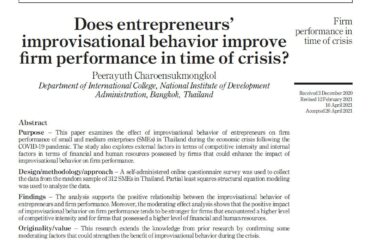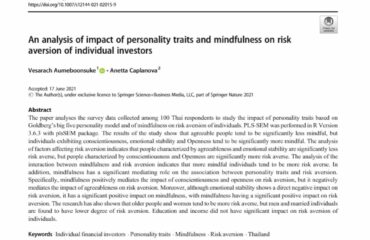The recent research conducted by the faculty of ICO NIDA, Assoc. Prof. Dr. Peerayuth Charoensukmongkol (coauthoring with Dr. Jenette Villegas Puyod), provided interesting evidence about the management practice to prevent employees’ resistance to change during this COVID-19 crisis.
Basically, resistance to change is a common phenomenon that happens among employees during the period of organizational change and transformation. Particularly amid the period of transformation caused by the COVID-19 crisis, employees’ resistance to change can be deleterious to the vitality of the organization to get through the crisis situation.
Under this uncertain circumstance, their research suggests that communication from management provided through the social media channel of the organization seems to be the effective practice to prevent and lessen employees’ resistance to change and their negative reactions during an organizational crisis. Basically, when employees obtain sufficient information conveyed by the management, they can have a clear understanding about the difficulties the organization is facing and the underlying reasons for the changes that need to be done to deal with the crisis.
However, their research noted that even when the crisis communication is effectively delivered to employees, employees may still feel reluctant to support the change when they do not gain sufficient support from their colleagues. For this reason, the altruistic behavior of employees in terms of Organizational Citizenship Behavior (OCB) is required to enhance the effect of communication on lessening employees’ resistance to change. Basically, OCB is the willingness of employees to voluntarily contribute to the organization beyond the scope of their responsibilities. The beneficial role of OCB during the change period is to promote helping behaviors and collaboration among employees, which facilitate them to collectively embrace the change initiative communicated by management.
Based on the survey data they collected from 522 employees from three public universities in the Philippines, they found that crisis communication could have a stronger impact on lowering employees’ resistance to change when OCB was highly expressed among employees. This finding implies that the crisis communication from management alone may not be sufficient to reduce employees’ resistance to change without interacting with OCB from employees.
In conclusion, their research recommended the management to quickly communicate information efficiently and effectively to employees during the crisis to ensure their employees have clear knowledge of the situation and to avoid negative reactions from employees. Apart from its role in crisis communication, it is equally important for management to encourage its employees to support each other and the organization by engaging in OCB. In this regard, the communication from management during the crisis must also contain a message that inspires employees to realize the importance of OCB as an imperative practice to help organization members and the organization itself collectively and successfully get though the crisis.
Source:
Puyod, J. V., & Charoensukmongkol, P. (2021), Interacting Effect of Social Media Crisis Communication and Organizational Citizenship Behavior on Employees’ Resistance to Change during the COVID-19 Crisis: Evidence from University Employees in the Philippines, Asia-Pacific Social Science Review, 21(3), 13–27.





